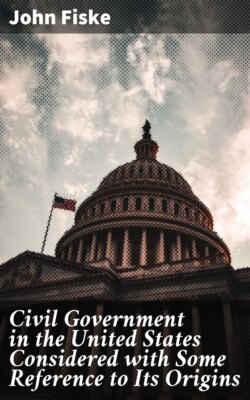Читать книгу Civil Government in the United States Considered with Some Reference to Its Origins - Fiske John - Страница 48
На сайте Литреса книга снята с продажи.
QUESTIONS ON THE TEXT. SUGGESTIVE QUESTIONS AND DIRECTIONS.
Оглавление1. Obtain the following documents:—
a. A town warrant.
b. A town report.
c. A tax bill, a permit, a certificate, or any town paper that
has or may have an official signature.
d. A report of the school committee.
If you live in a city, send to the clerk of a neighbouring town for a warrant, inclosing a stamp for the reply. City documents will answer most of the purposes of this exercise.
Make any of the foregoing documents the basis of a report.
2. Give an account of the following:—
a. The various kinds of taxes raised in your town, the amount of each
kind, the valuation, the rate, the proposed use of the money, etc.
b. The work of any department of the town government for a year, as, for
example, that of the overseers of the poor.
c. Any pressing need of your town, public sentiment towards it, the
probable cost of satisfying it, the obstacles in the way of meeting
it, etc.
3. A good way to arouse interest in the subject of town government is to organize the class as a town-meeting, and let it discuss live local questions in accordance with articles in a warrant. For helpful details attend a town-meeting, read the record of some meeting, consult some person familiar with town proceedings, or study the General Statutes.
To insure a discussion, it may be necessary at the outset for the teacher to assign to the several pupils single points to be expanded and presented in order.
There is an advantage in the teacher's serving as moderator. He may, as teacher, pause to give such directions and explanations as may be helpful to young citizens.
The pupils should be held up to the more obvious requirements of parliamentary law, and shown how to use its rules to accomplish various purposes.
4. Has the state a right to direct the education of its youth? If the state has such a right, are there any limits to the exercise of it? Does the right to direct the education of its youth carry with it the right to abolish private schools?
5. Is it wise to assist private educational institutions with public funds?
6. Ought teachers, if approved, to be appointed for one year only, or during good behaviour?
7. What classes of officers in a town should serve during good behaviour? What classes may be frequently changed without injury to the public?
8. Compare the school committee in your own state (if it is not Massachusetts) with that in Massachusetts.
9. Illustrate from personal knowledge the difference between real estate and personal property.
10. A loans B $1000. May A be taxed for the $1000? Why? May B be taxed for the $1000? Why? Is it right to tax both for $1000? Suppose B with the money buys goods of C. Is it right to tax the three for $1000 each?
11. A taxpayer worth $100,000 in personal property makes no return to the assessors. In their ignorance the assessors tax him for $50,000 only, and the tax is paid without question. Does the taxpayer act honourably?
12. What difficulties beset the work of the assessors?
13. Would anything be gained by exempting personal property from taxation? If so, what? Would anything be lost? If so, what?
14. Does any one absolutely escape taxation?
15. Does the poll-tax payer pay, in any sense, more than his poll-tax?
16. Are there any taxes that people pay without seeming to know it? If so, what? (See below, chap. viii. section 8.).
17. Have we clans to-day among ourselves? (Think of family reunions, people of the same name in a community, descendants of early settlers, etc.). What important differences exist between these modern so-called clans and the ancient ones?
18. What is a "clannish" spirit? Is it a good spirit or a bad one? Is it ever the same as patriotism?
19. Look up the meaning of ham, wick, and stead. Think of towns whose names contain these words; also of towns whose names contain the word tun or ton or town.
20. Give an account of the tithing-man in early New England.
21. In what sense is the word "parish" commonly used in the United States? Is the parish the same as the church? Has it any limits of territory?
22. In Massachusetts, clergymen were formerly paid out of the taxes of the township. How did this come about? In this practice was there a union or a separation of church and state?
23. Ministers are not now supported by taxation in the United States. What important change in the parish idea does this fact indicate? Is it a change for the better?
24. Are women who do not vote represented in town government?
25. Are boys and girls represented in town government?
26. Is there anybody in a town who is not represented in its government?
27. How are citizens of a town represented in state government?
28. How are citizens of a town represented in the national government?
29. Imagine a situation in which the ballot of a single voter in a town might affect the action of the national government.
